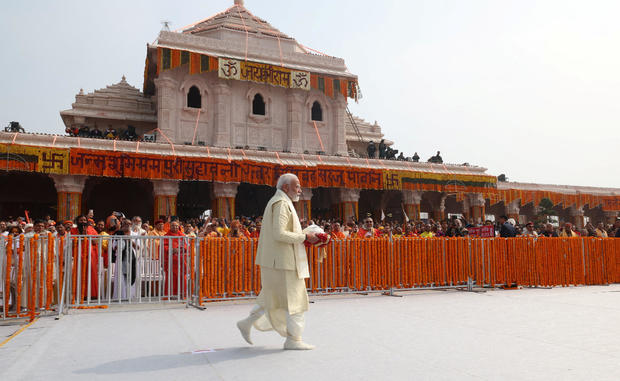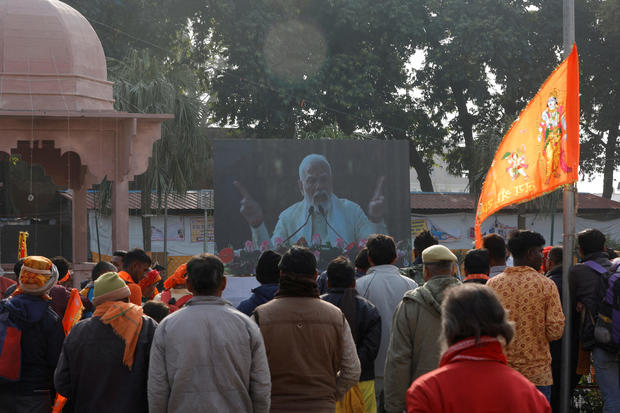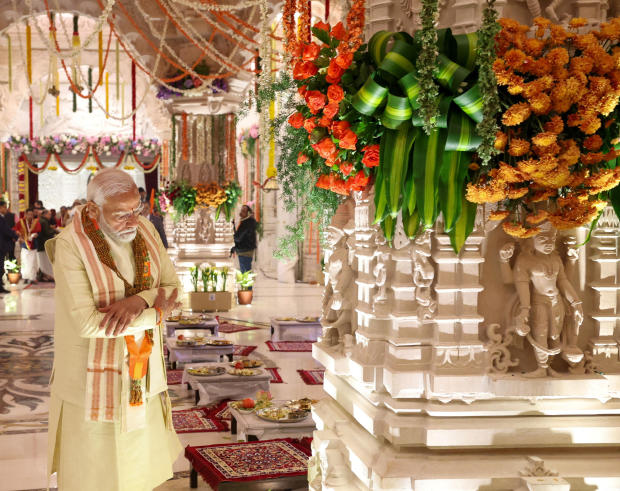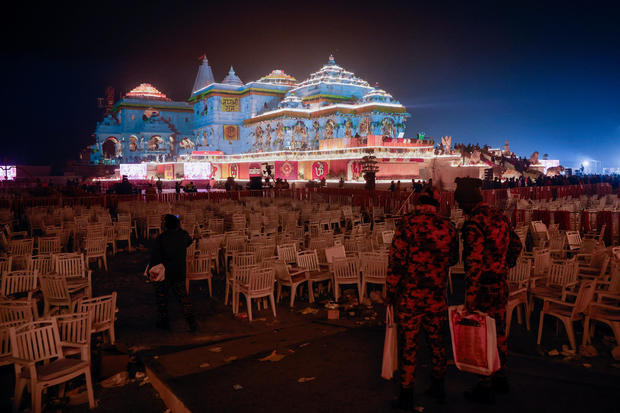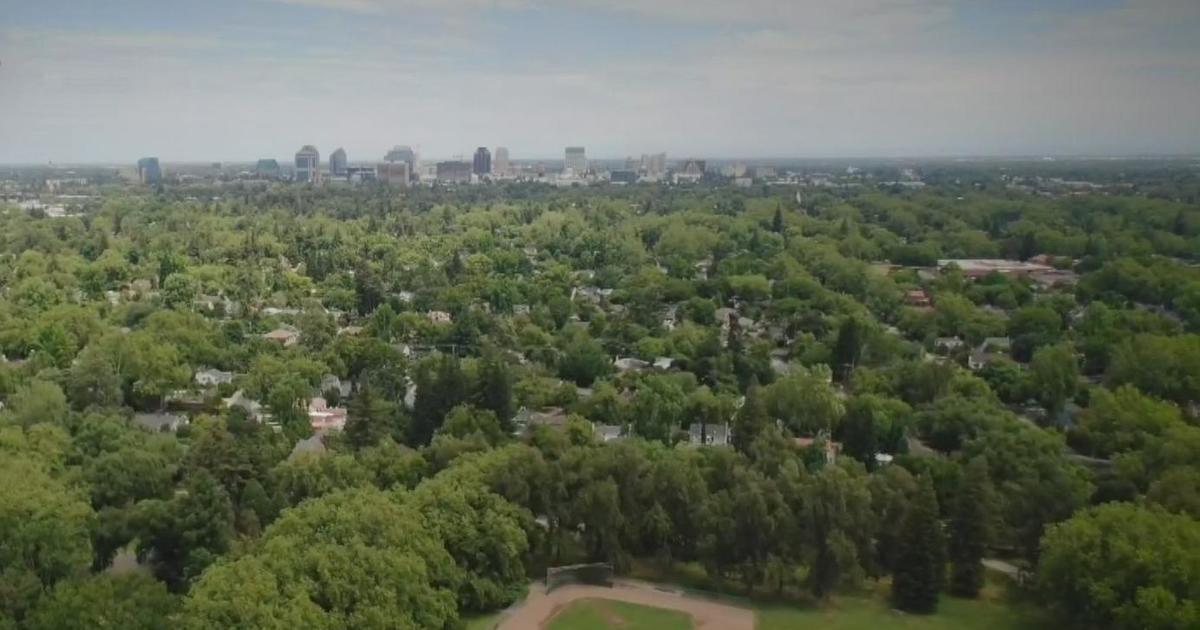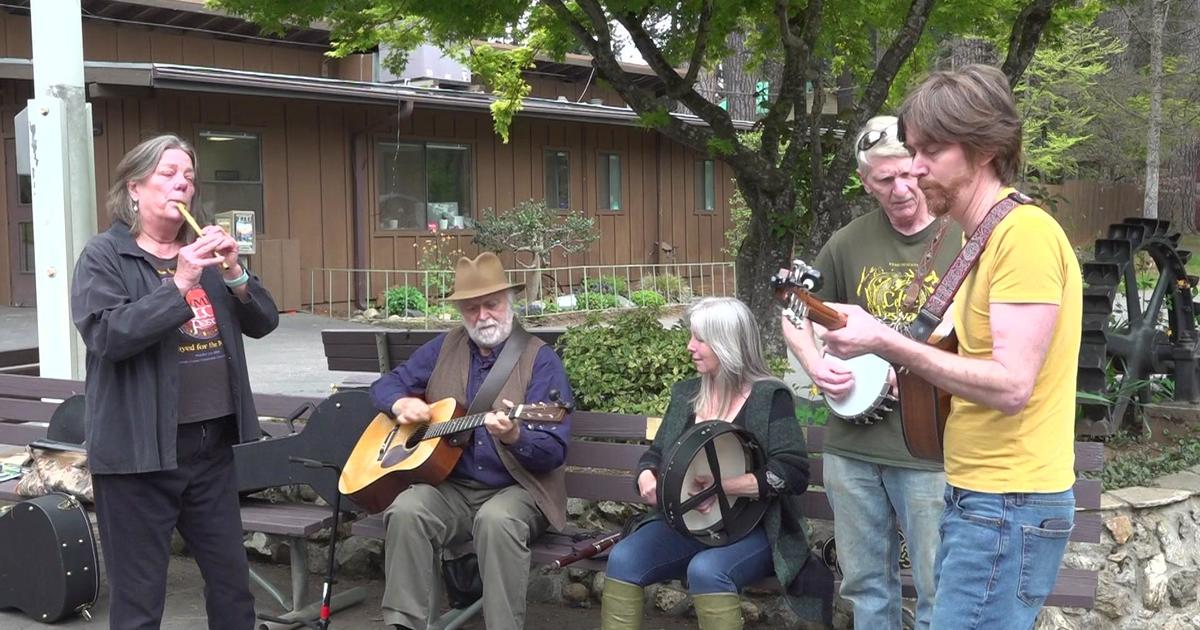India's Modi inaugurates huge Ayodhya Ram Temple on one of Hinduism's most revered but controversial sites
New Delhi — Hundreds of millions of Hindus celebrated the opening of a grand new temple in the northern India city of Ayodhya on Monday, but the decision by India's Hindu nationalist Prime Minister Narendra Modi to preside over the inauguration on a site at the heart of a centuries-old ownership dispute between India's Hindus and Muslims was a cause for anxiety among millions of others in the country.
Even some of Modi's Hindu political opponents have accused the leader of what has long been considered the world's biggest democracy of mixing politics with religion for personal gain.
The inauguration ceremony was a mega-event attended by thousands of religious leaders, politicians, Bollywood actors and billionaire business leaders. Ayodhya city, in Uttar Pradesh state, where the new temple is located, was decorated for the day, but also turned into a fortress by thousands of security forces. Millions more Hindus in India and around the world who couldn't be there to witness the inauguration in person were glued to TV screens to watch coverage of the event.
Why the Ayodhya temple is so special, and controversial
The new temple is no ordinary Hindu house of worship. The three-story, pink sandstone structure is built on one of Hinduism's holiest sites, revered as the birthplace of Lord Ram, one of the religion's most revered deities.
But for centuries, what stood at the site was a mosque, built by the Muslim Mughal Empire ruler Babur. That temple, built in the 1500s, is believed to have been constructed on the ruins of an even older Hindu temple.
The 16th century mosque, long disused by then, was demolished illegally by mobs of Hindu hardliners in 1992, who scaled a perimeter fence to tear it down. That incident ignited Hindu-Muslim riots that left more than 2,000 people dead and brought into sharp focus the fault line between members of the two religions in the area.
For almost two decades after the demolition of the mosque, right wing political parties including Modi's own BJP and other Hindu hardline groups rallied to build the Ram Temple on the site.
The Muslim community launched court battles over the mosque's destruction, seeking to block the construction of a Hindu temple and keep the site in Muslim hands.
Work started on the temple, however, after a 2019 ruling by India's Supreme Court in favor of the Hindus, which ordered the disputed piece of land to be given to them for the new temple. The ruling provided an alternate piece of land more than 15 miles away for Muslims to build a new mosque, but construction has not yet started.
Nearly 8,000 people attended Monday's ceremony in Ayodhya in person, while more than 10,000 police personnel guarded the city of 3 million, according to Indian media. Security was also stepped up nationwide, especially in places which have witnessed Hindu-Muslim violence in the past.
Modi vows "a new era" for India
The opening of the temple is expected to bolster Modi and his BJP ahead of general elections this summer, in which the prime minister is seeking a third term in office. Critics argue that Modi and his party have deliberately shored up their support by focusing on the revival of Hindu nationalism and the marginalization of India's Muslims, who make up around 15% of India's 1.4 billion people.
The BJP's support has risen under Modi while the opposition has frayed and become disorganized. If he wins a third term, it would set Modi up to become one of India's longest-serving prime ministers ever. It was, in fact, a vow made by the BJP 32 years ago to build a new temple at the site in Ayodhya that helped the party rise to power.
On Monday, inside the temple, television cameras beamed the ceremony around the world as Modi presided over the Pran Pratishtha, or consecration ceremony, for an idol of Lord Ram. The powerful imagery will be etched in many Indians' minds, showing Modi as the man who restored Lord Ram to his birthplace.
Modi spoke during the event of restoring Hindu pride and declared India to be at "the beginning of a new era."
"Lord Ram has finally arrived, following a wait of centuries," the premier said. "We have to now lay the foundation of India for the next 1,000 years. We take a pledge to build a capable, grand, divine India from this moment."
"Brought forward for electoral gain"
Only the ground floor of the temple was opened Monday. The structure is expected to be completed by the end of the year, and the decision to inaugurate the partially opened structure early, ahead of the summer elections, was criticized by Modi's opponents.
Several Hindu opposition political parties, including the Indian National Congress, stayed away from the inauguration, accusing Modi of politicizing a religious event.
"Lord Ram is worshipped by millions in our country. Religion is a personal matter. But the RSS/BJP have long made a political project of the temple in Ayodhya," the Congress party said in a statement. "The inauguration of the incomplete temple by the leaders of the BJP and the RSS has been obviously brought forward for electoral gain."
